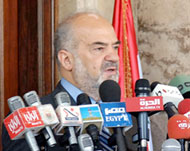Iraq wants control over security
Iraq’s ruling parties have demanded US forces cede control of security.

The demand came as the government launched an inquiry into a raid on a Shia mosque that ministers said saw “cold blooded” killings by US-led soldiers.
Jawad al-Maliki, a senior spokesman of the Shia Islamist Alliance and ally of Ibrahim al-Jaafari, the prime minister, said: “The alliance calls for a rapid restoration of security matters to the Iraqi government.”
After a confusing 24 hours following the bloodshed around Baghdad’s Mustafa mosque in which the US military restricted itself to issuing a somewhat opaque statement, US officials distanced themselves from the operation, calling it Iraqi-led.
Officials in Baghdad appeared to wait for input from Washington, underlining the sensitivity of the confrontation between Iraq’s Iranian-linked Shia leaders and the US forces at a time when Washington is pressing them to forge a unity government with Sunnis to avert civil war.
A day later, three broad versions of the events that led to the deaths of 20 – or possibly more – people persisted.
Iraq’s security minister accused US and Iraqi forces of killing 37 unarmed civilians in the mosque after tying them up.
Confusion
Residents and police, who put the death toll among the troops’ opponents at about 20, spoke of a fierce battle between the soldiers and armed men from the al-Mahdi Army militia of Muqtada al-Sadr, whose followers ran the mosque.
|
“The [Shia] Alliance calls for a rapid restoration of security matters to the Iraqi government” Jawad al-Maliki, |
And US officials, finally confirming they were describing the same incident, stuck by a statement saying Iraqi special forces, advised by US troops, killed 16 “insurgents” who fired on them first. They also insisted no troops entered any mosque and had freed an Iraqi being held prisoner.
Several Iraqi officials said the raid may have targeted a site used by militiamen to hold illegal courts and executions.
One source of confusion over the site may be that the mosque, close to Sadr City in northeast Baghdad, was not a traditional religious building but a compound of former Baath party offices converted by al-Sadr followers.
While US officials refused to acknowledge that the targets of the operation were Shia, and the sectarian affiliations of the Iraqi troops involved was unclear, the State Department official said the incident underlined what he called the need for Iraq’s security forces to be free of sectarian bias.
Formal soverignty
The United States handed over formal sovereignty in 2004 but 133,000 troops in the country give it the main say in security.
 |
|
The US’s Khalilzad has accused |
Government-run television repeated lengthy footage of the bodies of men in civilian clothes with no weapons in sight.
Hussein al-Tahan, Baghdad’s provincial governor said he would halt all cooperation with US forces.
Aides to al-Sadr denied any al-Mahdi Army fighters were present.
Ambassador Zalmay Khalilzad, at the centre of urgent US efforts to stem violence by creating a unity government, has said in recent days that the militias must be brought to heel and accused Iran of funding and training some armed groups.
President Jalal Talabani, a Kurd, who has been hosting the negotiations said: “We have to know the truth about what happened, and we must not be driven by rumours. This is a very dangerous incident which we must investigate.”
Al-Jaafari’s position
Meanwhile, news also emerged that Khalilzad has asked Abd al-Aziz al-Hakim, one of Iraq’s most prominent Shia politicians, to seek the withdrawal of the contentious nomination for a second term by Ibrahim al-Jaafari, the prime minister, two aides said on Monday.
 |
|
Opposition to Ibrahim al-Jaafari, |
They said Khalilzad had asked their boss during a meeting on Saturday to personally deliver the message to al-Jaafari.
The two, who were at the meeting but spoke on condition of anonymity because of the sensitive nature of the information, said al-Hakim initially refused, saying another “mechanism” needed to be found.
Later, however, lower-ranking members of al-Hakim’s political bloc, the Supreme Council for the Islamic Revolution in Iraq (SCIRI), did pass the Khalilzad message to members of al-Jaafari’s party, who delivered it to him, the aides said.
Ali al-Adeeb, a lawmaker with close ties to al-Jaafari and a member of his Dawa party, confirmed that he heard about Khalilzad’s message.
“The US ambassador’s position on al-Jaafari’s nomination is negative. They want him [the prime minister] to be under their control,” al-Adeeb said.
US Embassy spokeswoman Elizabeth Colton offered no comment.
President Jalal Talabani, a Kurd, has voiced his opposition to al-Jaafari, and formed a coalition with Sunni and some secular politicians in a bid to deny the prime minister a second term.